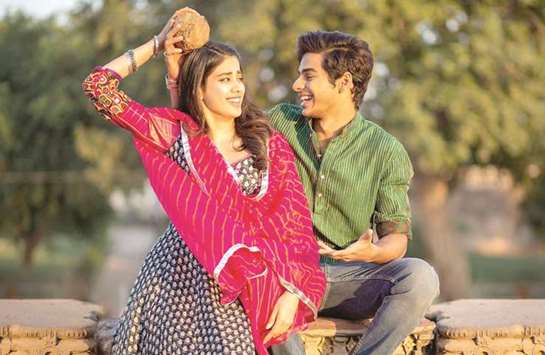First things first. Going by the trailer, Karan Johar’s production and Shashank Khaitans directorial Dhadak is nothing like the original film Sairat.
Dhadak is not an adaptation. It is a different beast altogether. Far more flamboyant and feral, filled with noise, colour and drama, leaving behind the comparatively compact world of Sairat where the stress was on the friction between the two castes which clashed over the lovers’ audacious crossover from into each other’s forbidden territory.
This is a more generic world of colour, drama and music undercut by an overweening innocence and a ruinous oblivion to the ground reality that makes the lovers look as pristine as Rishi Kapoor and Dimple Kapadia in Bobby.
Indeed, Ishaan Khatter and Janhvi Kapoor bring into play the same non-sexual dynamics of intense love that William Shakespeare and then Raj Kapoor mastered in their versions of Romeo and Juliet. While Janhvi plays the more knowing half of the couple, Ishaan makes innocence and surrender to the passion of first-love look convincing, sincere and heartfelt even in today’s age of unrelieved cynicism.
In Janhvi, we see heartstopping flashes of her legendary mother Sridevi, especially in the way she projects the arrogant proprietary pride of ownership every time she looks at her utterly smitten other.
I don’t know how much of Nagraj Manjule’s Sairat is preserved in Dhadak. No much, I suspect. I am sure Manjule would find it hard to recognise his own film in this hybrid avatar of colours and emotions that leap at us with enticing fervour.
But there is one proud mother up there smiling every time her daughter smiles on-screen.
A star is reborn.
Meanwhile, filmmaker Karan Johar avoided the use of the word “nepotism” — which had sparked a roaring debate in Bollywood two years ago — at the trailer launch of Dhadak. He says the talents — irrespective of their family name — work hard to be where they are.
Karan has launched a slew of celebrity children in Bollywood — from Alia Bhatt to Varun Dhawan and now Janhvi to Ananya Pandey.
At the trailer launch of Dhadak, Karan was asked what are the things he has to keep in mind when he makes films with such talents, who come with a film background.
He said: “That they grow beyond their name and make their own identity. I think that is our responsibility and their responsibility.”
“These days people focus more on names rather than the talent, but they tend to forget that one puts in a lot of hard work, heart, dedication, discipline and mental preparation to face the camera, the audience and the media... It is not easy, really. It is difficult.”
Without mentioning the term “nepotism”, which had become widely used when actress Kangana Ranaut accused Karan of being a “flagbearer of nepotism” two years ago, he said: “We always use a tag... Like a word of the season. I know that word (nepotism) was doing the rounds for last two years and I am again perhaps, encouraging the same concept... But I will not utter the word. But I want to say, they are not here because of that word, but because of their hard work.”
Asked what made him choose Janhvi and Ishaan for the film Dhadak, a remake of the hit Marathi film Sairat, Karan said: “The story is about an innocent love story. To bring such innocence on-screen, I needed first-time talent.”
He said Ishaan first struck him while judging a TV show with Ishaan’s step brother Shahid Kapoor.
“I was judging a show with Shahid where Ishaan happened to meet him on the set. So I just saw Ishaan and got a glimpse of a certain body language, expression and personality. So, I instinctively decided on him.
“I think Manish Malhotra is the fashion father of Janhvi. He knows her for a long time. He used to keep talking about her so much that I felt like I know her even before meeting her. Then I went to meet her family where I saw her. Then later when I met her personally, I saw her potential to be on-screen and saw that spark and excitement,” said Karan.
Directed by Shashank Khaitan, Dhadak is releasing on July 20. — IANS

SPOTLIGHT: Janhvi Kapoor and Ishaan Khatter in a scene from Dhadak.
